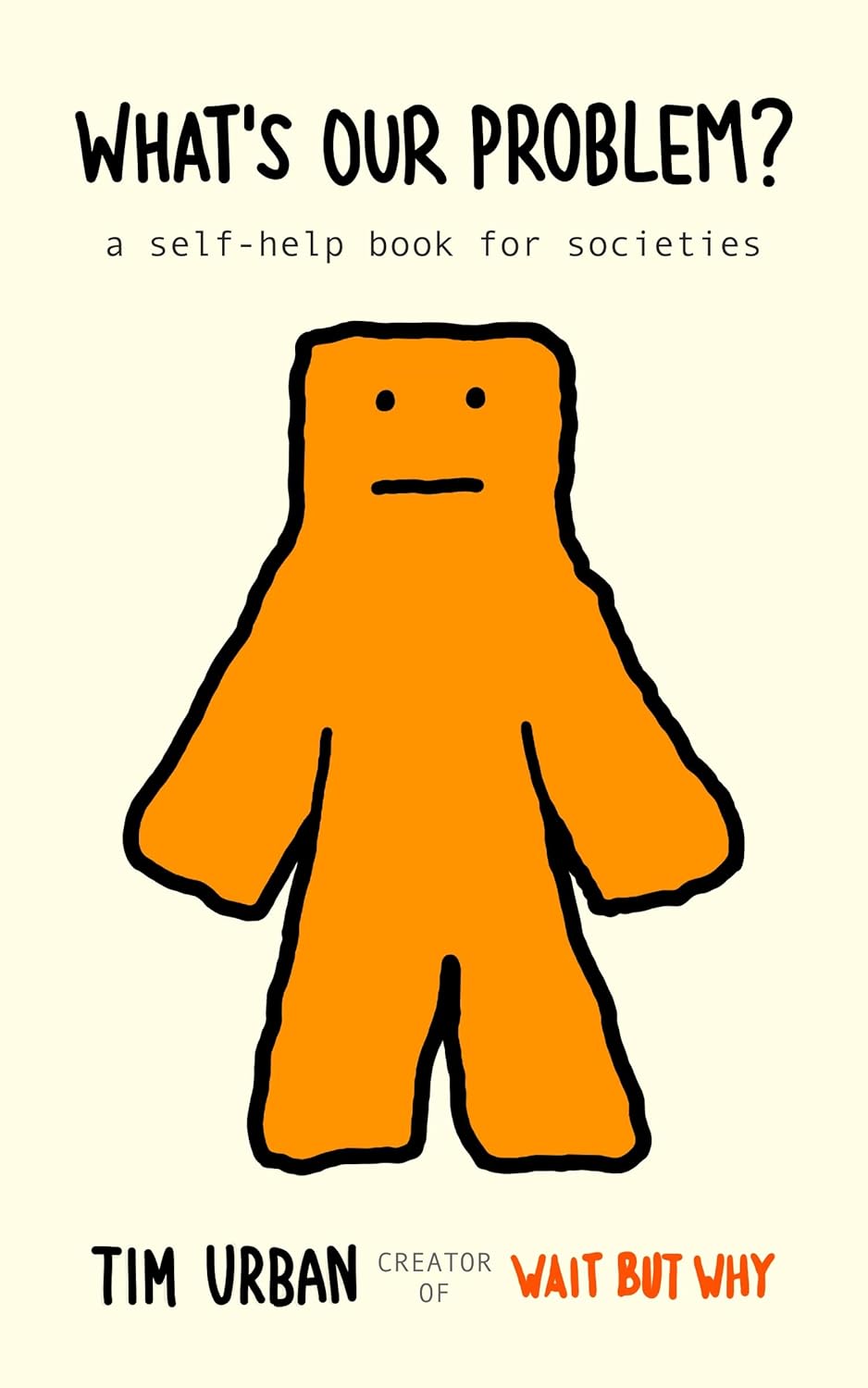
What's Our Problem?: A Self-Help Book for Societies
FREE Shipping
What's Our Problem?: A Self-Help Book for Societies
- Brand: Unbranded

Description
Courage level 1: Stop saying stuff you don’t believe … Saying things you don’t believe because others want you to is disrespecting your Inner Self. And your Inner Self deserves better.”
The book provides an explanation of how and why the US is so politically polarized. It brings up many concepts to analyze the polarization, with the core one being a distinction between the Higher vs. Primal (or a High-Rung vs. Low-Rung) mind. This distinction is similar to other distinctions of our minds’ thinking, such as System 1 vs. System 2 by Kahneman. Essentially, the Higher mind is the unique feature of humans - it’s what allows us to engage in complex ideas and science, to think rationally, and be conscious of our biases. On the other hand, the Primal mind is the leftover animalistic tendencies that still fulfill the primal functions of making sure we are safe, respected, belong to a community, not hungry, and ultimately spread our genes. The core issue is that the modern world is complex and requires a lot of Higher mind thinking, and unfortunately, often, the Primal mind overtakes, leading to tug-of-war scenarios rather than rational discussions. Have you ever seen a moth flying uselessly into a light? Stupid moth, right? Well, what’s causing the moth to do that is its primitive instincts – an urge to fly toward the light of the moon. Unfortunately for the moth, its instincts haven’t caught up with changes in the world – the relatively recent introduction of many nonmoon lights.He puts too much stake in "peer review" working in academia when that's also subject to egregious human error and bias. Needs more skepticism here, should probably talk to some professors. Update: please go read the review on Put A Num On It here for a much deeper analysis of some points that the book hopelessly misses: https://putanumonit.com/2023/03/06/wh... First, there’s been a shift toward concentrated tribalism. What do we mean by that? Well, throughout American history, there’s been plenty of internal political conflict – the civil war for example – and external conflict – like when the country was mostly unified during and following World War II.
Now, this can be a touchy subject, so Urban asks that you approach it with an open mind. In the interest of upsetting everyone equally, let’s look at modern lower-rung thinking from both sides of the political spectrum.Urban begins by explaining his first big concept: the thinking ladder. Most of our conversations, according to him, happen along the horizontal axis of *what* we think. But very little attention is given to the vertical axis, which symbolizes *how* we think. Low-rung thinking is done by our Primitive Mind, which evolved over time to be good at surviving in small tribes with primitive technology, but not very good at living in the technologically advanced and diverse liberal democracies of today. High-rung thinking is done by our Higher Mind, which is able to override the Primitive Mind and care about more abstract principles like truth and wisdom. He applies his ladder framework to groups of people and politics in general to show the emergent properties that these different ways of thinking have. He then argues that "golems" (his term for large groups of people engaged in collective low-rung thinking) are becoming more and more common because of hypercharged tribalism. I wrestled internally with how to rate this book. What wins me over is that the book calls itself out on the things about the book that piss me off, which I appreciate. It makes it feel more like a conversation than a presentation, which is nice. Eventually, you can start saying what you really think to your inner circle of trusted friends. This will boost your confidence and authenticity and can give you the space to further reflect on your ideas. Just remember to be open to growth and discussion – you don’t want to create an echo chamber. There’s a saying that sums up the merry-go-round of society: wise people create good times, good times create foolish people, foolish people create bad times, and these bad times, in turn, create wise people. Wouldn’t it be nice if we could just jump from foolish people to wise people, skipping the bad times altogether?
And let’s be clear, everyone is both a low and high-rung thinker, it's not just one particular group or type of person. Certain movements can be low-rung in tendency, sure, but it’s crucial to remember that it's not an identity, just a spectrum that societies ebb and flow towards and away from.forms hypotheses from the bottom up and follows evidence wherever it takes you (default position on any topic is ‘I don’t know’). I broadly agreed with all the ideas in the book - including the arguments against social justice thinking, so perhaps that is part of the reason that I didn't rate the book more highly. And perhaps that's unfair? Now, the far-left isn’t much better than the far-right, and Tim focuses a lot on the problem of “wokeness” and Social Justice Warriors (or, as he calls them, Social Justice Fundamentalists, SJFs).
- Fruugo ID: 258392218-563234582
- EAN: 764486781913
-
Sold by: Fruugo
